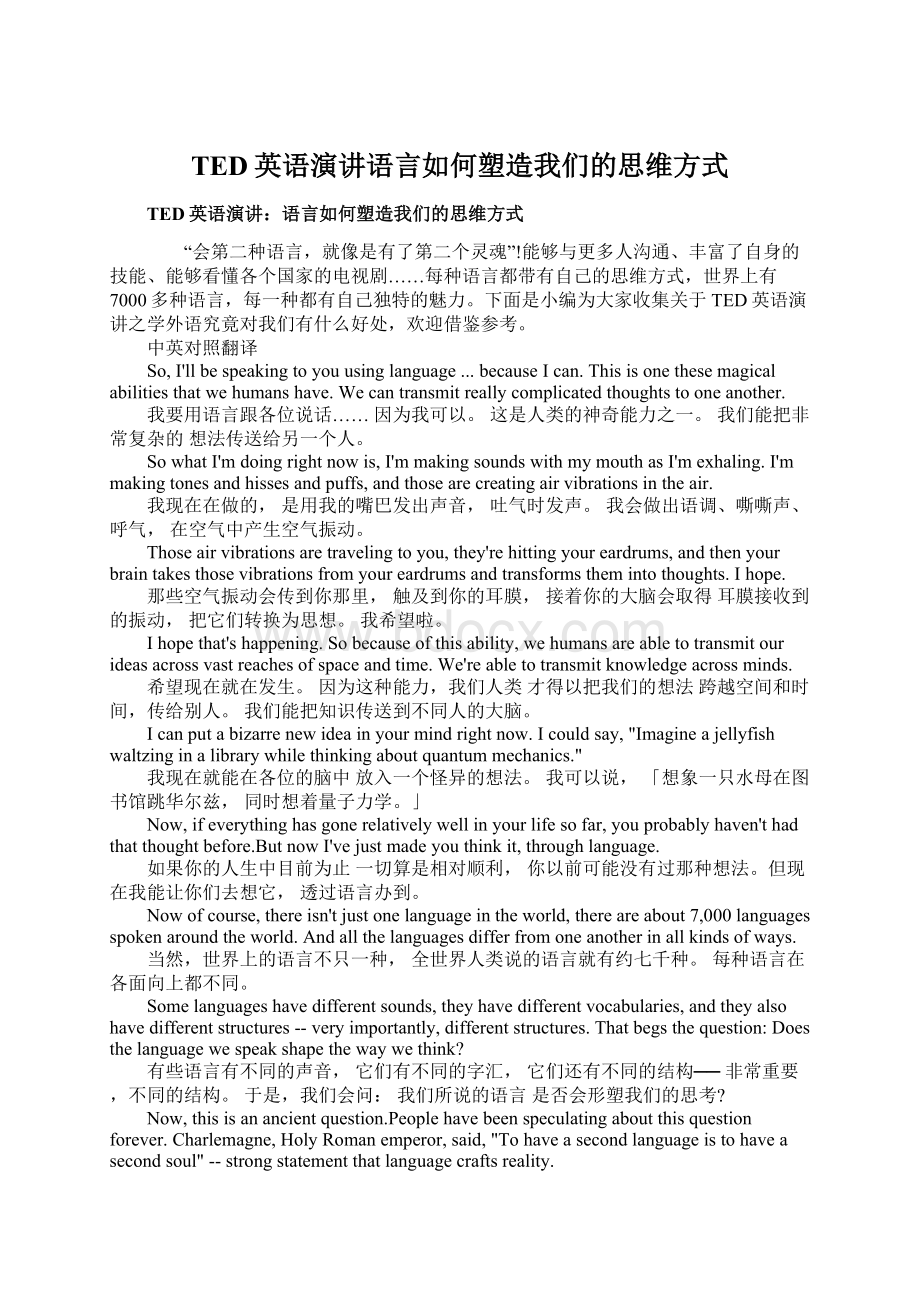TED英语演讲语言如何塑造我们的思维方式Word文件下载.docx
《TED英语演讲语言如何塑造我们的思维方式Word文件下载.docx》由会员分享,可在线阅读,更多相关《TED英语演讲语言如何塑造我们的思维方式Word文件下载.docx(8页珍藏版)》请在冰豆网上搜索。

Ihopethat'
shappening.Sobecauseofthisability,wehumansareabletotransmitourideasacrossvastreachesofspaceandtime.We'
reabletotransmitknowledgeacrossminds.
希望现在就在发生。
因为这种能力,我们人类才得以把我们的想法跨越空间和时间,传给别人。
我们能把知识传送到不同人的大脑。
Icanputabizarrenewideainyourmindrightnow.Icouldsay,"
Imagineajellyfishwaltzinginalibrarywhilethinkingaboutquantummechanics."
我现在就能在各位的脑中放入一个怪异的想法。
我可以说,「想象一只水母在图书馆跳华尔兹,同时想着量子力学。
」
Now,ifeverythinghasgonerelativelywellinyourlifesofar,youprobablyhaven'
thadthatthoughtbefore.ButnowI'
vejustmadeyouthinkit,throughlanguage.
如果你的人生中目前为止一切算是相对顺利,你以前可能没有过那种想法。
但现在我能让你们去想它,透过语言办到。
Nowofcourse,thereisn'
tjustonelanguageintheworld,thereareabout7,000languagesspokenaroundtheworld.Andallthelanguagesdifferfromoneanotherinallkindsofways.
当然,世界上的语言不只一种,全世界人类说的语言就有约七千种。
每种语言在各面向上都不同。
Somelanguageshavedifferentsounds,theyhavedifferentvocabularies,andtheyalsohavedifferentstructures--veryimportantly,differentstructures.Thatbegsthequestion:
Doesthelanguagewespeakshapethewaywethink?
有些语言有不同的声音,它们有不同的字汇,它们还有不同的结构──非常重要,不同的结构。
于是,我们会问:
我们所说的语言是否会形塑我们的思考?
Now,thisisanancientquestion.Peoplehavebeenspeculatingaboutthisquestionforever.Charlemagne,HolyRomanemperor,said,"
Tohaveasecondlanguageistohaveasecondsoul"
--strongstatementthatlanguagecraftsreality.
这个问题历史悠久。
长年来大家都一直在思索这个问题。
神圣罗马大帝查理曼说过:
「有第二种语言,就象是有第二个灵魂」──很有力的陈述,说明了语言制造出现实。
Butontheotherhand,ShakespearehasJulietsay,"
What'
sinaname?
Arosebyanyothernamewouldsmellassweet."
Well,thatsuggeststhatmaybelanguagedoesn'
tcraftreality.
但,另一方面,莎士比亚笔下的茱丽叶说:
「名字有什么用?
玫瑰不叫玫瑰,依然芳香如故。
」那意味着,语言不见得会制造现实。
Theseargumentshavegonebackandforthforthousandsofyears.Butuntilrecently,therehasn'
tbeenanydatatohelpusdecideeitherway.
数千年来,这些论点一直你来我往。
但,直到最近之前,都没有任何资料来协助我们决定是哪一种。
Recently,inmylabandotherlabsaroundtheworld,we'
vestarteddoingresearch,andnowwehaveactualscientificdatatoweighinonthisquestion.
最近,在我的实验室和世界上其他的实验室,我们开始做研究,现在,我们有了真正的科学资料,可以来探究这个问题。
Soletmetellyouaboutsomeofmyfavoriteexamples.I'
llstartwithanexamplefromanAboriginalcommunityinAustraliathatIhadthechancetoworkwith.ThesearetheKuukThaayorrepeople.
让我分享一些我最喜欢的例子。
我的第一个例子来自澳洲的一个原住民部落,我有机会和他们合作。
他们是库克萨优里族,
TheyliveinPormpuraawattheverywestedgeofCapeYork.What'
scoolaboutKuukThaayorreis,inKuukThaayorre,theydon'
tusewordslike"
left"
and"
right,"
andinstead,everythingisincardinaldirections:
north,south,eastandwest.
他们住在波姆浦洛,那是约克角半岛的西部边缘。
库克萨优里族很酷的一点是,在库克萨优里语中,他们不用「左」、「右」这些字,一切都是用基本的方向:
北、南、东、西。
AndwhenIsayeverything,Ireallymeaneverything.Youwouldsaysomethinglike,"
Oh,there'
sanantonyoursouthwestleg."
Or,"
Moveyourcuptothenorth-northeastalittlebit."
我说「一切」,真的就是指一切。
你可能会说这样的话:
「喔,在你的脚的西南方有一只蚂蚁。
」或「把你的杯子向北北东移一点。
Infact,thewaythatyousay"
hello"
inKuukThaayorreisyousay,"
Whichwayareyougoing?
"
Andtheanswershouldbe,"
North-northeastinthefardistance.Howaboutyou?
事实上,在库克萨优里语中,说「哈囉」的方式是:
「你要去哪个方向?
」而回应应该是:
「北北东的远方。
你呢?
Soimagineasyou'
rewalkingaroundyourday,everypersonyougreet,youhavetoreportyourheadingdirection.
所以,想象一下你当天走到任何地方,你问候每一个人时,都得要报告你朝什么方向前进。
Butthatwouldactuallygetyouorientedprettyfast,right?
Becauseyouliterallycouldn'
tgetpast"
hello,"
ifyoudidn'
tknowwhichwayyouweregoing.Infact,peoplewhospeaklanguageslikethisstayorientedreallywell.
但那会让你很快速确定方位,对吧?
因为如果不知道你在朝什么方向前进,你就说不出「哈囉」。
事实上,说这类语言的人,都一直很有方向感。
Theystayorientedbetterthanweusedtothinkhumanscould.Weusedtothinkthathumanswereworsethanothercreaturesbecauseofsomebiologicalexcuse:
"
Oh,wedon'
thavemagnetsinourbeaksorinourscales."
他们的方向感比我们认为人类能办到的程度更好。
我们以前认为人类这方面比其他生物更糟,是因为某种生物借口:
「我们的鸟喙或鳞片里面没有内建的磁铁。
No;
ifyourlanguageandyourculturetrainsyoutodoit,actually,youcandoit.Therearehumansaroundtheworldwhostayorientedreallywell.
不对;
如果你的语言和你的文化训练你去做,你其实能办到。
世界上有些人类的方向感非常好。
Andjusttogetusinagreementabouthowdifferentthisisfromthewaywedoit,Iwantyoualltocloseyoureyesforasecondandpointsoutheast.
为了让大家能够了解我们的做法上有多大的差异,我想请大家闭上眼睛一下子,请指出东南方。
Keepyoureyesclosed.Point.OK,soyoucanopenyoureyes.Iseeyouguyspointingthere,there,there,there,there...Idon'
tknowwhichwayitismyself--Youhavenotbeenalotofhelp.
眼睛别张开。
指出来。
好,可以张开眼睛了。
我看到大家指向那里、那里、那里、那里…我自己也不知道是哪一边---你们实在也没帮上忙。
Solet'
sjustsaytheaccuracyinthisroomwasnotveryhigh.Thisisabigdifferenceincognitiveabilityacrosslanguages,right?
Whereonegroup--verydistinguishedgrouplikeyouguys--
姑且就说在这间房间中的正确率没有很高。
不同语言中的认知能力差别很大,对吧?
一个族群──非常卓越的族群,比如各位--
doesn'
tknowwhichwayiswhich,butinanothergroup,Icouldaskafive-year-oldandtheywouldknow.Therearealsoreallybigdifferencesinhowpeoplethinkabouttime.
不知道哪边是哪个方向,但到了另一个族群,我去问五岁的小孩,他们也会知道。
大家对于时间的思考方式也有很大的差异。
SohereIhavepicturesofmygrandfatheratdifferentages.AndifIaskanEnglishspeakertoorganizetime,theymightlayitoutthisway,fromlefttoright.
这里是我祖父的照片,他在照片中的年龄都不同。
如果我请说英语的人依据时间来整理,他们可能会这样排列,从左到右。
Thishastodowithwritingdirection.IfyouwereaspeakerofHebreworArabic,youmightdoitgoingintheoppositedirection,fromrighttoleft.
这与书写的方向有关。
如果你说希伯来语或阿拉伯语,你可能会用反方向,从右到左。
ButhowwouldtheKuukThaayorre,thisAboriginalgroupIjusttoldyouabout,doit?
Theydon'
right."
Letmegiveyouhint.Whenwesatpeoplefacingsouth,theyorganizedtimefromlefttoright.
但库克萨优里族,我刚刚和各位说的原住民族群,会怎么做?
他们没有「左」和「右」这些字。
让我提示各位。
当我们让他们面向南方时,他们会把时间从左向右排。
Whenwesatthemfacingnorth,theyorganizedtimefromrighttoleft.Whenwesatthemfacingeast,timecametowardsthebody.What'
sthepattern?
Easttowest,right?
Soforthem,
当我们让他们面向北方时,他们会把时间从右向左排。
当我们让他们面向东方时,时间的方向朝向他们的身体。
模式是什么?
由东向西,对吧?
所以,对他们而言,
timedoesn'
tactuallygetlockedonthebodyatall,itgetslockedonthelandscape.Soforme,ifI'
mfacingthisway,thentimegoesthisway,andifI'
mfacingthisway,thentimegoesthisway.I'
mfacingthisway,timegoesthisway--
时间完全不会被身体限制住,时间是和地景绑在一起的。
对我来说,当我面向这边,时间就朝这个方向,当我面向这边,时间就朝这个方向。
面向这边,时间就朝这个方向--
veryegocentricofmetohavethedirectionoftimechasemearoundeverytimeIturnmybody.FortheKuukThaayorre,timeislockedonthelandscape.It'
sadramaticallydifferentwayofthinkingabouttime.
非常自我中心,每当我转身,也让时间的方向跟着我转。
对库克萨优里族,时间和地景绑在一起。
这是非常不同的时间思考方式。
Here'
sanotherreallysmarthumantrait.SupposeIaskyouhowmanypenguinsarethere.Well,IbetIknowhowyou'
dsolvethatproblemifyousolvedit.Youwent,"
One,two,three,four,five,six,seven,eight."
还有个很聪明的人类技俩。
如果我问各位,这里有几只企鹅?
我打赌我知道各位是如何解答这个问题的。
你会用:
「一、二、三、四、五、六、七、八。
Youcountedthem.Younamedeachonewithanumber,andthelastnumberyousaidwasthenumberofpenguins.Thisisalittletrickthatyou'
retaughttouseaskids.Youlearnthenumberlistandyoulearnhowtoapplyit.
你用数的。
你给毎一只一个号码,你说出的最后一个号码,就是企鹅的数目。
这是个小计俩,你小时候就有人教你用了。
你学到了数字表,你学到了如何应用它。
Alittlelinguistictrick.Well,somelanguagesdon'
tdothis,becausesomelanguagesdon'
thaveexactnumberwords.They'
relanguagesthatdon'
thaveawordlike"
seven"
orawordlike"
eight."
小小的语言计俩。
有些语言并不会这样做,因为有些语言并没有代表数字的字。
这些语言并没有像「七」这样的字,也没有「八」。
Infact,peoplewhospeaktheselanguagesdon'
tcount,andtheyhavetroublekeepingtrackofexactquantities.So,forexample,ifIaskyoutomatchthisnumberofpenguinstothesamenumberofducks,youwouldbeabletodothatbycounting.
事实上,说这些语言的人不会计数,他们无法记得确实的「量」。
比如,如果我请各位把刚才企鹅的数目对应到同样数目的鸭子,你可以靠计数的方式做到。
Butfolkswhodon'
thavethatlinguistictraitcan'
tdothat.Languagesalsodifferinhowtheydivideupthecolorspectrum--thevisualworld.Somelanguageshavelotsofwordsforcolors,somehaveonlyacouplewords,"
light"
dark."
但语言没有这项特征的人就没办法。
语言也有不同的方式来区别色谱──视觉世界。
有些语言中有很多颜色的字,有些语言只有几个字,「亮」和「暗」。
Andlanguagesdifferinwheretheyputboundariesbetweencolors.So,forexample,inEnglish,there'
saworldforbluethatcoversallofthecolorsthatyoucanseeonthescreen,butinRussian,thereisn'
tasingleword.
不同语言也有不同的颜色界线。
比如,在英文中就有蓝色的世界,包含荧幕上的所有这些颜色,但在俄语中,就没有单一个字。
Instead,Russianspeakershavetodifferentiatebetweenlightblue,"
goluboy,"
anddarkblue,"
siniy."
SoRussianshavethislifetimeofexperienceof,inlanguage,distinguishingthesetwocolors.
说俄语的人,得要去区别浅蓝色「goluboy」,和深蓝色「siniy」。
所以俄国人一生当中都会在语言上把这两种颜色区别开来。
Whenwetestpeople'
sabilitytoperceptuallydiscriminatethesecolors,whatwefindisthatRussianspeakersarefasteracrossthislinguisticboundary.Th